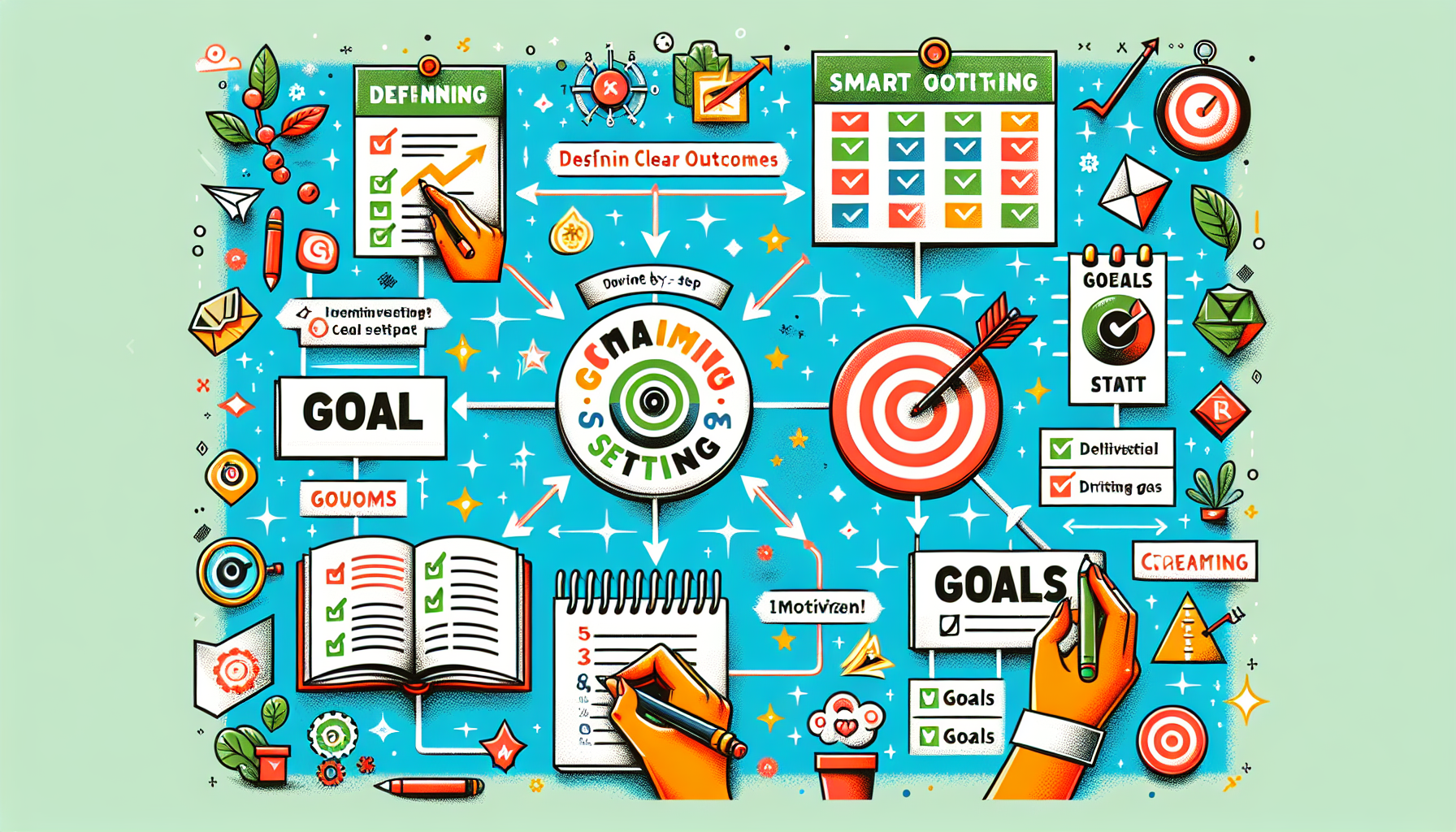Looking to achieve your goals effectively? Goal setting is the foundation for success, whether in your career, health, or personal life. This guide will walk you through practical steps and expert tips on how to set and reach your goals.
Key Takeaways
Goal setting is crucial for focused efforts and productivity, acting as a roadmap towards personal and professional success.
Utilizing the SMART criteria (Specific, Measurable, Achievable, Relevant, Time-bound) helps in creating clear and actionable goals.
Regularly reviewing and adjusting goals, celebrating achievements, and aligning your environment with your ambitions enhance motivation and commitment.
Understanding Goal Setting

Goal setting is more than just a motivational buzzword; it’s a structured process that helps you select a target or objective to achieve. Think of it as the compass that directs your efforts and keeps you on track, ensuring you don’t stray off course. Whether you’re looking to advance in your career, improve your health, or enhance your personal life, setting clear goals is the first step towards success.
But why is goal setting so crucial? For starters, it helps you focus your efforts, allowing you to spot distractions and concentrate on what truly matters. Imagine trying to hit a target without knowing where it is; you’d waste a lot of time and energy. Goals give you that target, making your efforts more efficient and purposeful.
We’ll explore both personal and professional goals to ensure you have a comprehensive understanding of the goal-setting process. From defining what success looks like to implementing the systems that will help you achieve your goals, this guide covers it all. So, let’s get started by understanding why goal setting is so important.
The Importance of Goal Setting
Setting goals provides a long-term vision and short-term motivation, creating a clear path towards success. Imagine embarking on a journey without a defined destination; you’d likely wander aimlessly, wasting time and resources. Goals act as your guiding star, helping you navigate through life with purpose and direction.
Effective goal setting doesn’t just increase movement; it boosts productivity, benefiting both individuals and organizations. When you have a specific goal in mind, you’re more likely to take actions that lead you towards that goal, making your efforts more productive and focused. This structured approach can significantly enhance your likelihood of success.
Moreover, setting clear goals provides motivation and a structured path to achieving one’s objectives. Decisions and actions aligned with your goals help maintain focus and effectiveness, ensuring you stay on the right track. Whether you’re setting personal goals or team goals, understanding the importance of goal setting is the first step towards achieving success.
Goal Setting Theory
The goal-setting theory, proposed by Edwin Locke, emphasizes the importance of setting clear and challenging goals. According to Locke, challenging goals lead to greater employee performance, as they push individuals to strive harder and accomplish more. But it’s not just about setting difficult goals; they must also be realistic and attainable to ensure success.
Locke’s theory advocates for a balance between goal difficulty and realism, combined with self-motivation. This balance is crucial because overly challenging goals can lead to frustration and burnout, while too easy goals fail to motivate and inspire. By setting clear, challenging, yet achievable goals, you can enhance your performance and achieve your desired outcomes.
Understanding the goal-setting theory provides a solid foundation for setting effective goals. It helps you recognize the importance of clarity and challenge, ensuring that your goals are both motivating and attainable. With this knowledge, you’re better equipped to set goals that will drive you towards success.
Steps to Effective Goal Setting

Now that we understand the importance and theory behind goal setting, let’s dive into the steps to set effective goals. There are three basic strategies for goal setting that are crucial for establishing a solid foundation. These strategies will help you design a roadmap that guides you from your current state to your desired outcome.
First, it’s essential to set different levels of goals—lifetime, five-year, yearly, monthly, weekly, and daily. This comprehensive planning ensures that every step you take leads you closer to your ultimate goals. For instance, a five-year plan might include smaller, intermediate goals needed to achieve your overarching lifetime goals.
Once you’ve planned your goals, the next crucial step is to take action to bring those goals to fruition. Each step you take should be designed to lead to the next, creating a seamless path towards achieving your goals. Let’s explore these steps in more detail, starting with defining your desired outcome.
Defining Your Desired Outcome
Defining your desired outcome is the first step in the goal-setting process. It’s essential for focusing your life’s direction and assessing your success. Start by establishing your lifetime aspirations, which serve as the foundation for your personal goal setting. These long-term aspirations will guide you in setting relevant intermediate goals.
Having a clear understanding of what you want to achieve in the long run helps you stay focused and motivated. It’s like having a vision of your ideal future, which drives you to take the necessary steps to make it a reality. Defining your desired outcome, whether it’s a personal goal like improving health or a career goal like advancing in your profession, is key to success.
Once you have a clear vision of your desired outcome, you can start breaking it down into smaller, more manageable goals. These intermediate goals will serve as stepping stones, guiding you towards your ultimate aspirations. Let’s move on to creating SMART goals, which will help you achieve these outcomes effectively.
Creating SMART Goals
SMART goals are specific, measurable, achievable, relevant, and time-bound. This framework enhances clarity and focus in goal setting, making it easier to track progress and achieve your desired outcomes. For example, instead of setting a vague goal like “lose weight,” a SMART goal would be “lose 25 pounds by the Fourth of July.”
Specific goals are vital because they allow you to know exactly what you’re aiming for and track your progress. Measurable criteria provide a way to assess your progress tangibly, ensuring you’re on track to achieve your goals. Achievable goals are realistic and attainable, preventing frustration and maintaining motivation.
By setting SMART goals, you can ensure that your objectives are clear, focused, and attainable according to smart criteria. This structured approach makes it easier to stay on track and achieve your desired outcomes.
Now, let’s discuss the importance of writing down your goals to make them more tangible and actionable.
Writing Down Your Goals
Writing down your goals makes them feel tangible, giving you a sense of accountability and commitment. When you write goals, it’s like making a pact with yourself, increasing the likelihood of following through. To keep your goals top of mind, display them in visible places like mirrors, computer screens, or walls.
Using a positive tone when writing your goals fosters motivation and a constructive mindset towards achieving them. Breaking larger objectives into smaller, manageable segments further enhances the effectiveness of your goal-setting process. This approach ensures that you can tackle each step without feeling overwhelmed.
By writing down your goals and keeping them visible, you continuously remind yourself of your commitments, making it easier to stay focused and motivated. This practice is a critical component of successful goal setting and helps you achieve your desired outcomes.
Developing an Action Plan
Once you’ve set your goals, the next step is to develop an action plan. Successful goal setting involves careful planning and a commitment to the required effort. Breaking down larger objectives into smaller, actionable steps enhances the likelihood of success. This approach makes tasks more manageable and less overwhelming.
Identifying specific requirements for each goal can clarify necessary actions and resources. For instance, if your goal is to complete a degree, you’ll need to identify the courses required, study materials, and time needed for each class. Allocating dedicated time for pursuing your goals is crucial for maintaining focus and progress.
An action plan provides a clear roadmap to follow, making it easier to stay on track and achieve your goals. Let’s explore how to set milestones and create a timeline to further enhance the effectiveness of your action plan.
Setting Milestones
Setting milestones is an essential part of your action plan. These intermediate checkpoints allow you to track progress and can significantly boost your motivation as you achieve them. Think of milestones as the stepping stones that lead you to your bigger goals. Breaking down goals into smaller, manageable parts helps you stay focused and motivated.
Achieving these intermediate milestones provides a sense of accomplishment, which further fuels your motivation to pursue your ultimate goals. Each milestone you reach brings you one step closer to your desired outcome, reinforcing your commitment and drive. Incorporating intermediate milestones into your goals helps maintain focus and encourages perseverance.
By setting clear milestones, you can keep track of your progress and ensure that you’re on the right path. These milestones not only help you stay on track but also provide opportunities to celebrate your achievements along the way, keeping your motivation high.
Creating a Timeline
Creating a timeline is another critical component of your action plan. The purpose of a timeline is to visualize tasks, milestones, and deadlines, creating a sense of urgency. When you have a clear timeline, it helps you organize and prioritize your goals effectively. This structured approach ensures that you stay focused and on track.
A timeline helps you keep track of tasks and deadlines, ensuring that you remain focused on your goals. By setting specific deadlines for each task, you create a sense of urgency, which can help maintain motivation and drive. This sense of urgency encourages timely completion of goals and helps prevent procrastination.
With a well-defined timeline, you can see the bigger picture and understand how each task fits into your overall plan. This visualization helps you stay organized and ensures that you’re consistently making progress towards your goals.
Staying Motivated and Overcoming Obstacles

Staying motivated and overcoming obstacles are crucial for achieving your goals. Maintaining motivation requires understanding the underlying reasons for pursuing your goals. When you have a clear understanding of why your goals matter, it’s easier to stay focused and driven. Reflecting on your progress regularly can also help maintain motivation and clarity in your goals.
Monitoring your progress allows you to identify challenges early and adjust your approach as needed. By keeping track of your achievements, no matter how small, you can boost your confidence and stay motivated. Acknowledging and celebrating successes is vital for maintaining momentum and motivation.
Understanding your goals’ reasons and regularly reflecting on your progress are key strategies for staying motivated. Let’s delve deeper into how to track your progress and adjust your goals to overcome obstacles effectively.
Tracking Progress
Tracking your progress is vital for maintaining motivation and ensuring that you’re on the right path. Regularly evaluating your progress boosts motivation and allows for necessary adjustments. By measuring your goals, you gain insights into your progress and can make informed decisions to stay on track.
Using digital tools or journals can effectively help manage and track your progress towards goals. Establishing deadlines alongside tasks fosters a greater sense of urgency and accountability. Documenting your goals enhances accountability and serves as a constant reminder of your objectives.
Clear tracking mechanisms help you understand your improvement and stay focused on important activities. Acknowledging achievements, no matter how small, can significantly enhance your motivation to pursue future goals.
Adjusting Goals
Flexibility in goal-setting is essential for adapting to changing circumstances and challenges. Regularly reviewing your goals can help ensure they remain relevant and aligned with current priorities. If you fail to meet your goals, learn from the experience, as it can provide valuable insights for future efforts.
A common misconception is that failing to reach a goal means there was something wrong with the goal or the approach. However, it’s essential to understand that adjustments are a natural part of the process. If a goal no longer holds attraction, consider letting it go to focus on more relevant objectives.
Updating your goals is also important; about 44% of employees update their goals after significant changes in their roles. By being flexible and ready to adjust, you can ensure that your goals remain meaningful and attainable.
Achieving Your Goals

Achieving your goals requires more than just setting them; it involves creating the right environment and celebrating your successes. Consideration of the surrounding system is necessary for effective goal setting to prevent obstacles. Setting goals within the right system is crucial for facilitating consistent progress.
After achieving a goal, it’s important to take time to enjoy the satisfaction and review your overall goal plans. This reflection ensures that the rest of your goals remain relevant and aligned with your aspirations. Celebrating small achievements can help sustain motivation during the goal pursuit.
By aligning your environment with your goals and celebrating your successes, you can maintain motivation and drive. Let’s explore how to align your environment with your goals and the importance of celebrating your achievements.
Aligning Environment with Goals
Aligning your environment with your ambitions is crucial for making consistent progress toward your goals. Visual cues play an important role in goal achievement as they encourage actions by making your goals more visible and accessible. For example, placing reminders in your workspace keeps your goals top of mind.
Creating a supportive environment involves minimizing distractions and making essential tasks more straightforward. By organizing your space and eliminating potential distractions, you can focus more effectively on your goals. This alignment ensures that your environment supports your ambitions, making it easier to stay on track.
Aligning your environment with your goals creates a conducive atmosphere for success. This alignment helps maintain focus and motivation, ensuring that you consistently make progress toward your desired outcomes.
Celebrating Success
Celebrating achievements reinforces a positive mindset and enhances motivation for future goals. Recognizing and celebrating small wins builds confidence, encouraging individuals to pursue even greater goals. Acknowledging successes, no matter how small, helps maintain momentum and motivates continued effort.
Celebration methods include self-reflection, sharing achievements with others, and rewarding oneself. Celebrating achievements reinforces your commitment to goals and boosts motivation to pursue new objectives.
Celebrating your successes is an essential part of the goal-setting process. It helps sustain motivation and drive, ensuring that you remain focused on achieving your goals.
Examples of Personal and Professional Goals

Setting personal and professional goals is essential for guiding actions and achieving long-term success. Personal goals can include fitness targets like losing weight, educational aspirations like completing a degree, or personal development aims like improving communication skills. Career goals can encompass skill development targets, successful project completions, and long-term aspirations like achieving a leadership position in your organization.
Both personal and professional goals demonstrate the application of goal-setting principles, emphasizing the importance of clarity and intention in achieving success. By setting clear and specific goals, you can create a roadmap that guides you towards your desired outcomes.
Let’s explore some detailed examples of personal and professional goals to help you understand how to apply these principles effectively.
Personal Goals
Common fitness targets include objectives like losing weight or running a marathon, which can guide long-term health improvements. These goals are often specific and measurable, making it easier to track progress and stay motivated. For example, setting a quantifiable objective to lose 10 pounds in three months provides a clear target to aim for.
Educational aspirations often involve pursuing degrees or certifications that align with personal interests and career ambitions. Whether it’s completing a bachelor’s degree or obtaining a professional certification, these goals can significantly enhance your knowledge and skills.
Personal development goals can encompass enhancing emotional intelligence, resilience, and interpersonal skills. By setting specific, measurable, and attainable personal goals, you can create a clear roadmap for achieving your aspirations. These goals provide direction and motivation, helping you make meaningful progress in your personal life.
Career Goals
Skill enhancement is a common career goal aimed at professional growth and adaptability in the workplace. Developing workplace skills, such as communication and leadership, is crucial for advancement in any career. For instance, setting a goal to improve your public speaking skills can significantly boost your professional profile.
Completing specific projects on time can serve as measurable career objectives that demonstrate capability. These projects provide clear targets and deadlines, making it easier to track progress and showcase your skills. Career goals are essential for guiding professional development and fostering growth in various skills.
Setting clear and specific career goals creates a roadmap for achieving your professional aspirations. These goals provide direction and motivation, helping you make meaningful progress in your career.
Tips for Successful Goal Setting
Effective goal setting boosts productivity and clarifies organizational advantages. Adjusting goals based on circumstances is critical to align efforts with changing role expectations. Periodically reviewing longer-term plans helps reflect changing priorities and ensures that your goals remain relevant.
Daily updates of your To-Do List keep the goal-setting process ongoing and relevant. A lack of proper planning for achieving goals contributes significantly to failure. Creating a long list of goals can backfire, making it difficult to achieve any if pursued simultaneously.
Simplicity in goal setting eliminates distractions and allows focus on important tasks. Choice architecture significantly influences decision-making and affects long-term goal achievement. Following guidelines for setting effective goals ensures that they are achievable and relevant.
Prioritizing Goals
Focusing on a single goal at a time helps to enhance clarity and commitment, ultimately leading to more effective progress. Prioritizing goals helps individuals focus on what matters most, avoiding the pitfalls of spreading themselves too thin. By concentrating on one objective, individuals can allocate their time and resources more efficiently, resulting in better outcomes.
By prioritizing your goals, you can ensure that you’re focusing on the most important and relevant objectives. This approach helps you stay on track and make meaningful progress towards your desired outcomes.
Avoiding Unrealistic Goals
To maintain motivation, it’s vital to select goals that resonate personally and challenge you to push your limits. Unrealistic goals can lead to frustration and burnout, making it difficult to stay motivated and focused. It’s essential to set goals that are challenging yet attainable to ensure success.
Setting realistic and achievable goals maintains motivation and drive. This approach ensures that your goals are both challenging and attainable, helping you achieve goals and make meaningful goals progress towards your desired outcome goals.
Summary
In summary, mastering goal setting involves understanding the importance of setting clear and challenging goals, creating a detailed action plan, and maintaining motivation along the way. By following the steps outlined in this guide, you can set meaningful goals, develop a roadmap to achieve them, and stay motivated even when obstacles arise.
Effective goal setting provides a clear path towards success, helping you focus your efforts and achieve your desired outcomes. Whether you’re setting personal or professional goals, the principles and strategies discussed in this guide can help you turn your dreams into reality.
Remember, goal setting is a continuous process that requires regular reflection and adjustment. By staying committed and flexible, you can achieve your goals and enjoy the satisfaction of your accomplishments. Now, it’s time to start setting and achieving your goals. You’ve got this!
All Goal Setting Articles
Top 8 Goal Setting Techniques for Achieving Success
10 Best SMART Goal Examples for Work in 2024
How to Write Tangible Goals: Step-by-Step Guide with Examples
The Purpose of Goals: Why They Matter and How to Achieve Them
Top Strategies for Boosting Motivation to Achieve Goals
How to Set Goals and Achieve Them: Proven Strategies for Success
Top Employee Goal Setting Examples for Achieving Success
Frequently Asked Questions
What are SMART goals?
SMART goals are a great way to set clear and actionable targets, as they must be specific, measurable, achievable, relevant, and time-bound. By using this framework, you’ll find it easier to stay focused and track your progress.
Why is it important to write down your goals?
It’s crucial to write down your goals because it transforms them from mere thoughts into tangible commitments, boosting your accountability. Plus, it keeps your aspirations at the forefront of your mind, driving you toward action.
How do you stay motivated when pursuing long-term goals?
To stay motivated with long-term goals, focus on your reasons for pursuing them, keep track of your progress, and celebrate small wins along the way. This approach keeps your spirits high and helps you stay committed.
What should you do if you fail to meet a goal?
If you fail to meet a goal, take the time to learn from it and adjust your approach. Being flexible and updating your goals can help you stay aligned with what truly matters.
How can setting milestones help in achieving goals?
Setting milestones is a great way to track your progress and stay motivated along the journey. Each time you hit a milestone, it gives you a sense of accomplishment that keeps you focused on your ultimate goals.